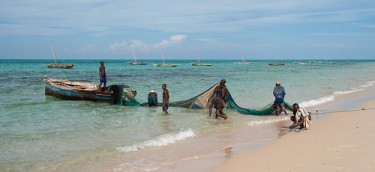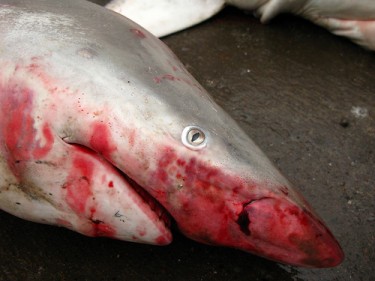Tourists come from South Africa and all over the world to relax on Mozambique's beaches, go on sports fishing expeditions and dive in the warm waters of the Indian Ocean.
It is estimated two-thirds of the Mozambican population lives on the coast and many depend on the ocean for a livelihood from fishing – and often communities near large tourist destinations do not feel money from this tourism circulating. So involvement of Mozambicans as dive professionals, tourism professionals and conservationists is crucial to a sustainable future for Mozambique's coastal areas.
Enter the Bitonga Divers – an NGO championed by Mozambique's first dive professional, the inspiring Carlos Macuacua, based in Tofo, a town in Inhambane province.
Quoting their website
In 2006, when Bitonga Divers was formed, there were no Moçambican divemasters or instructors. Since that time, in partnership with Ocean Revolution and foreign owned dive centers, Bitonga Divers now has trained eight Mozambican Instructors and 11 divemasters.
The Bitonga Divers also invest in outreach to communities, showing megafauna and underwater scenes to people living near the coast, many of whom have never been underwater or seen these animals alive. At first the response was weak, but after years of tireless work, the Divers say they bring together 250 people easily for a night-time session. Community leaders participate too.
Through this kind of outreach, people begin to make positive links between protecting sea life, tourism and economic development.
Alarm over overfishing
Recently Tofo-based tour operators and community associations have raised the alarm that government programs intended to boost commercial fishing have resulted in overfishing of rays, sharks and dolphins in the area.
As travel writer Aaron Gekoski explains in the online travel magazine Go World Travel
The biggest threat facing Tofo, sadly, is a familiar one. Overfishing has had a dramatic effect on these waters over recent years. Only five years ago, divers could be treated to schools of devil rays 300 thick. Now they are lucky to see 10 at a time. Gigantic, unforgiving walls of gill nets frequently ensnare manta rays.
Casa Barry, one of the big dive-oriented lodges in Tofo, discusses conservation and brings attention the issue of illegal fishing on its blog, like this post on the rescue and successful release of a loggerhead sea turtle.
The most contentious allegation (made in a recent article in Canal Moz newspaper [pt]), is that the World Bank is financing these government programs, that are designed to help local fisherman to catch more and bigger species.
Márcia Horst responded on Reflectindo Sobre Moçambique [pt]
Isto eh inacreditável…alguém acredita que o Banco mundial financiou barcos a motor e redes aos pescadores das zonas turísticas, sem uma previa formacao, sem capacitação nenhuma, sobre as espécies mais importantes destas praia, que nós todos dependemos delas para o nosso desenvolvimento turistico, e hoje, a cada dia esses pescadores só pescam essas espécies que o povo depende delas..EU ESTOU EM ESTADO DE CHOQUE, e me pergunto, onde estavam essas ditas associações de preservação, concernência, whatever se chamam, quando o banco mundial fez essa entrega?
Irrespective of the alleged involvement of the World Bank (which has not publicly commented on the issue), it is safe to say economic incentives are driving this kind of fishing.
Marine Mega Fauna Foundation, an organization working with Bitonga Divers, explains
Inshore fisheries are extremely lucrative by local standards, with the fins from a single shark being worth around 3000 Mets (approximately US$120).
The documentary “Shiver” was filmed last year with Macuacua and the Marine Mega Fauna Foundation, and goes into depth about the shark fishing problem.
Much of what is caught in Tofo is actually processed and exported out of Maputo to China and Asian markets. Centro Terra Viva, a Mozambican environmental NGO, describes a bust of a Chinese-occupied house ‘illegally processing’ marine products last year [pt]
Apesar do inventário das quantidades e espécies encontradas ainda não ter finalizado a STV publicou imagens, adiantando que foram encontradas grandes quantidades de barbatanas de tubarão, entre as quais algumas ainda estavam no processo de secagem, holotúrias (também designados por pepinos-do-mar e localmente por megajojos), diversas conchas, cavalos-marinhos secos em sacos de serapilheira, cágados vivos em tanques e carapaças de tartarugas marinhas. As autoridades acreditam que estes produtos conservados seriam exportados para a China ou outros mercados asiáticos.
The government of Mozambique has repeatedly stated locally, nationally and internationally that it is combating illegal fishing – but it seems that its efforts, and those of dedicated conservationists like the Bitonga Divers, are not enough to stop the problem.











12 comments